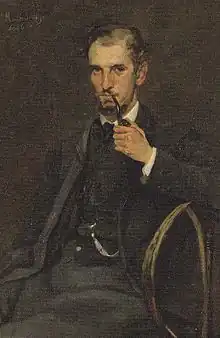
By Martin van Andringa, 1888
Jan Hendrik Leopold (May 11, 1865 – June 21, 1925) was a Dutch poet and classicist.
Leopold was born at 's-Hertogenbosch, Netherlands. After living in Arnhem he moved to Rotterdam early in 1892, where he became a teacher of classical languages at the Gymnasium Erasmianum. He translated portions of The Rubaiyat of Omar Khayyam into Dutch. In a more modern vein, his deafness undoubtedly contributed to the melancholic tone of much of his Symbolist work of the literary Dutch renaissance.Having thus described his life as "one long plaint", he died in Rotterdam. His on-campus cenotaph includes his portrait and one of his poems.[1]
Works
- Studia Peerlkampiana (1892)
- Ad Spinozae opera posthuma (1902)
- Stoïsche wijsheid (1904)
- M. Antonius Imperator (1908)
- Uit den tuin van Epicurus (1910)
- Verzen (1912)
- Cheops (1916)
- Oostersch (1924)
- Verzen II (1926)
Gallery
 Cheops
Cheops 1913 photograph by Henri Berssenbrugge
1913 photograph by Henri Berssenbrugge Pontresina, Switzerland, 1920
Pontresina, Switzerland, 1920 Cenotaph, by Charlotte van Pallandt
Cenotaph, by Charlotte van Pallandt
References
- ↑ "Jan Hendrik Leopold | Dutch writer, Symbolist, Expressionist | Britannica". www.britannica.com.
External links
 Media related to J.H. Leopold at Wikimedia Commons
Media related to J.H. Leopold at Wikimedia Commons- (in Dutch) Koninklijke Bibliotheek - J.H. Leopold
- (in Dutch) Digitale Bibliotheek Nederlandse Letteren - J.H. Leopold
This article is issued from Wikipedia. The text is licensed under Creative Commons - Attribution - Sharealike. Additional terms may apply for the media files.